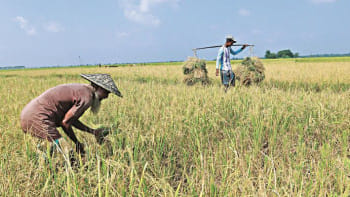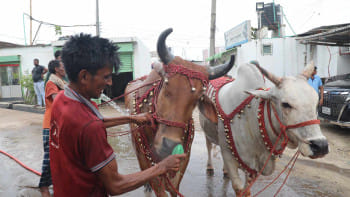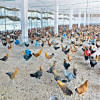Chattogram's live bird markets expose disturbing gaps in poultry welfare

With a population exceeding 18 crore, Bangladesh ranks as one of the most densely populated countries in the world. It is also the third-largest producer of poultry globally. However, the country's poultry marketing and slaughter systems fail to meet international standards. As demand for chicken rises, poultry markets are expanding rapidly, particularly in urban centres. In local traditional bazaars, live bird markets (LBMs) are a common feature, where chickens are often sold alive.
In recent years, commercial farms have established a "broiler meat chain" where broiler and Sonali chickens are processed and sold in both markets and supermarkets, with various cuts available. However, there is a divided public opinion on the acceptance of processed meat. Additionally, as Bangladesh is a Muslim-majority country, the slaughter of animals in LBMs follows religious practices to ensure halal food.
Chattogram, the largest city in Bangladesh with a population of over 53 lakh, relies heavily on broiler and Sonali chickens. These chickens are usually raised on farms on the city's outskirts and transported to LBMs by middlemen. At the markets, the chickens are kept in cages or on floors until slaughtered, following a religious call. No pre-slaughter protocols, such as stunning, are observed as they would be in more modern slaughterhouses. Generally, the chickens are allowed to bleed out before their carcasses are processed according to consumer preferences.
Poultry welfare issues in established slaughterhouses are well-documented and typically include concerns about transport duration, death on arrival, plumage conditions, injuries, and post-slaughter conditions. While these issues have been thoroughly researched, there is a lack of studies addressing the neglect of animal welfare in Bangladesh's LBMs. A recent market-based study in Chattogram aims to analyse the market context and highlight policy gaps in broiler welfare.
The findings from this study shed light on disturbing welfare violations in Chattogram's live bird markets. Overcrowded cage systems, lack of access to food and water, poor ventilation, and unsanitary conditions are rampant, raising ethical and public health concerns. The study, which spanned 10 LBMs and 50 outlets, found that 22 percent of outlets left chickens without food or water for over five hours, violating their basic physiological needs. More than 40 percent of outlets lacked proper ventilation, and 96 percent had no exhaust systems, severely compromising air quality and thermal comfort. Additionally, only 24 percent of vendors sharpened their knives daily, prolonging the suffering of the animals.
Inappropriate handling methods, such as catching chickens by their wings or legs, cause injuries, fear, and trauma, indicating a lack of humane practices. These combined stressors contribute to dehydration, weakened immunity, and higher mortality rates, particularly in smaller outlets. The study reveals that welfare shortcomings are systemic and rooted in ignorance, with no regulatory oversight. The lack of animal welfare enforcement results in an increase in diseases and infections. For example, in traditional bazaars, slaughtered chickens and their waste are kept together in the same containers, creating a breeding ground for bacterial contamination.
Furthermore, although cages are cleaned every few days, they often remain unclean for extended periods, while sick chickens are neglected. Prolonged transportation without proper access to food and water leaves them vulnerable to infections that spread to other chickens.
The study calls for urgent policy reforms to enforce welfare standards and improve market practices. It is a stark reminder that poultry are sentient beings deserving of humane treatment, not just units of production.
Dr Md Ridoan Pasha, the leading investigator and a prominent animal welfare researcher at Chattogram Veterinary and Animal Sciences University (CVASU), emphasised the high level of negligence and carelessness towards chickens in the LBMs, causing suffering at every stage, from unloading to slaughter. Alarmingly, few customers or stakeholders seem aware of these serious issues.
Professor Dr Mohammad Rashedul Alam, an animal welfare specialist at CVASU, further stressed the need for strict adherence to welfare standards across the poultry supply chain, from farm to LBM. He advocated for hands-on training for all vendors to prevent animal welfare abuses, ensuring both food safety and the well-being of the birds before and after slaughter.
Addressing the systemic welfare violations in Chattogram's LBMs requires an assessment of lairage practices, rearing conditions, stocking densities, and hygiene protocols, among other factors. Only through comprehensive policy reforms can the welfare of broiler chickens be improved.
Minhazur Rahman Shihab is researcher at the Institute of Forestry and Environmental Sciences, University of Chittagong.
Tanhida Towhid is researcher at the Institute of Forestry and Environmental Sciences, University of Chittagong.
Views expressed in this article are the author's own.
Follow The Daily Star Opinion on Facebook for the latest opinions, commentaries and analyses by experts and professionals. To contribute your article or letter to The Daily Star Opinion, see our guidelines for submission.


 For all latest news, follow The Daily Star's Google News channel.
For all latest news, follow The Daily Star's Google News channel. 










Comments